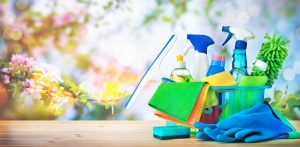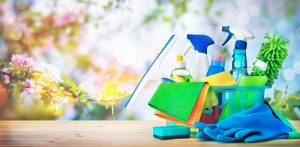 Spring is right around the corner. When I was a little girl growing up in upstate New York, all the families on our block began to clean house when the snow melted. We packed up our winter clothes and coats and put away our sleds and brought out our bikes and lighter apparel. It was a time for reorganizing and making our house spic and span and ready for the spring and summer months.
Spring is right around the corner. When I was a little girl growing up in upstate New York, all the families on our block began to clean house when the snow melted. We packed up our winter clothes and coats and put away our sleds and brought out our bikes and lighter apparel. It was a time for reorganizing and making our house spic and span and ready for the spring and summer months.
Whether or not you enjoy cleaning, there are many benefits. Studies show that people are happier when they come home to a clean home. Cleaning your house can give you a feeling of accomplishment. It makes you feel “lighter” as the mess around you can cause stress. Breathing in dust and touching dirty counters and tabletops can promote illness. And, if stuff is everywhere, it is easy to trip or fall. Furthermore, when my house is dirty, I don’t want to entertain people since I don’t want them to see my mess. It is much easier to invite people into a clean home. And, who of us wants to visit someone else’s dirty house? Not too many of us. Thus, Spring cleaning is a good idea and provides many benefits.
During this Spring, perhaps we might think about Spring cleaning in more ways than one. In the Jewish community, it is traditional to clean the house before Passover. Part of that spring cleaning is to get rid of all the leaven from the house. All baked goods, baking soda, and anything else with yeast is to be thrown out. In Bible times, God told Moses & the Israelites: “Seven days you shall eat unleavened bread. On the first day you shall remove leaven from your houses. For whoever eats leavened bread from the first day until the seventh day, that person shall be cut off from Israel” (Exodus 12:15).
So, God told them to get rid of all leaven, and abstain from eating it for a week. He spoke these words before the first Passover, when God struck down all the firstborn males in Egypt, sparing those firstborns who put the blood of the lamb on their doorposts.
The word “unleavened” is found 51 times in the Jewish Scriptures and nine times in the New Testament. The word “leaven” is often used to represent “sin” in the New Testament.
Then Jesus said to them, “Take heed and beware of the leaven of the Pharisees and the Sadducees” (Matthew 16:6).
Just as the Israelites were told to remove the leaven from their homes, we are also called to remove leaven (sin) from our lives. The problem is that we cannot do that on our own, no matter how hard we try. How many days did it take before you or I broke our New Year’s resolution? For me, some time on January 1! That is why Yeshua our Messiah came to remove the leaven in our lives.
“For He made Him (Yeshua) who knew no sin to be sin for us, that we might become the righteousness of God in Him” (2 Corinthians 5:21).
 As we near the season celebrating redemption and resurrection, perhaps we can take some time to prepare our “house” by allowing God to do some house cleaning in our hearts. Have we not loved God in some way? Have we wronged our neighbor? Have we done something we shouldn’t have done and not done something we should have done? Let’s take some time to examine our hearts and motives, confessing all of it to God, making things right with those we have wronged, so we can be ready to enter this upcoming Passover season.
As we near the season celebrating redemption and resurrection, perhaps we can take some time to prepare our “house” by allowing God to do some house cleaning in our hearts. Have we not loved God in some way? Have we wronged our neighbor? Have we done something we shouldn’t have done and not done something we should have done? Let’s take some time to examine our hearts and motives, confessing all of it to God, making things right with those we have wronged, so we can be ready to enter this upcoming Passover season.
Robyn Wilk is the founder of Le’Chayim (To Life!) Ministries where she serves as a Jewish Outreach Specialist and Consultant. If your church, home group, home school group, Bible study, Sunday school or Bible study would like a Messiah in the Passover presentation or Seder, please contact Robyn at www.lechayim.org to schedule.

Comments